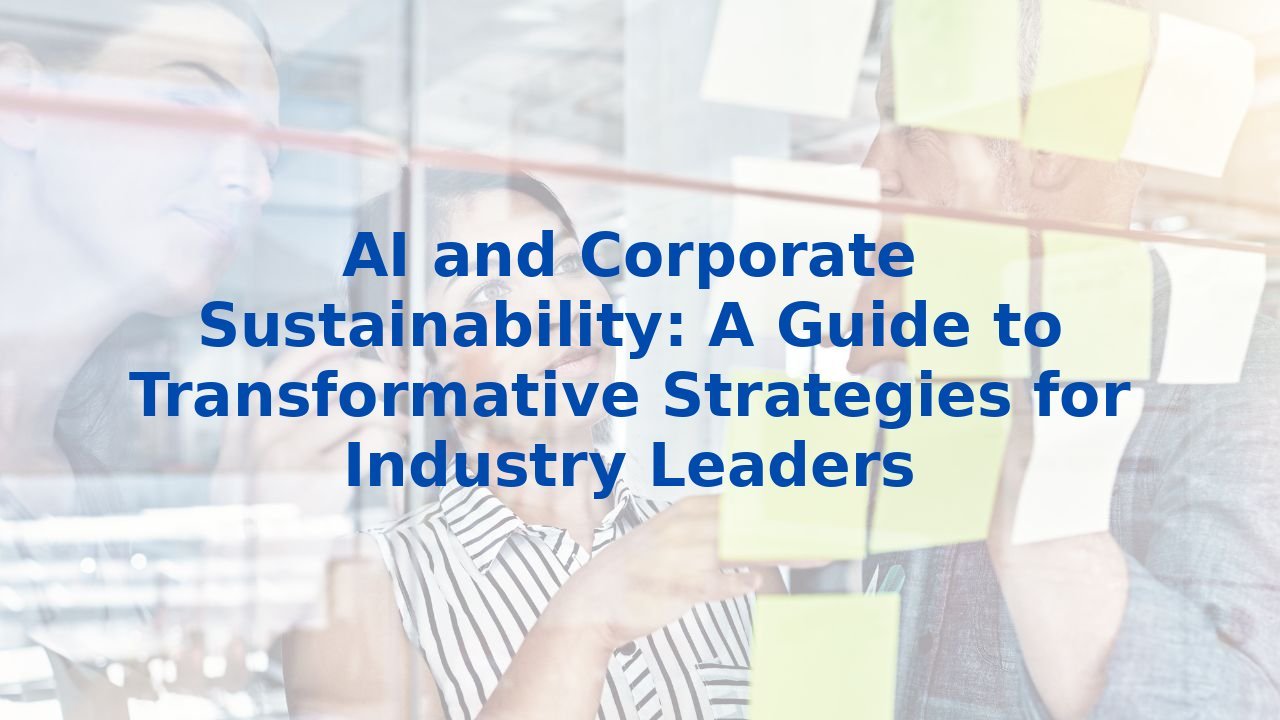AI and Corporate Sustainability: A Guide to Transformative Strategies for Industry Leaders
AI and Corporate Sustainability: A Guide to Transformative Strategies for Industry Leaders
In an era where corporate responsibility is paramount, the fusion of Artificial Intelligence (AI) and sustainability strategies has ignited profound transformations within industries. Leaders who recognize this synergy not only enhance operational efficiency but also contribute meaningfully to global sustainability efforts. By leveraging AI, organizations can reshape their processes, make informed decisions, and ultimately foster a culture of continuous improvement.
The Power of AI in Corporate Sustainability
At its core, AI is a strategic catalyst for sustainable development. By harnessing data-driven insights, organizations can pinpoint inefficiencies, streamline operations, and adopt more sustainable practices. With AI's predictive capabilities, businesses have the power to anticipate challenges and align their strategies with long-term sustainability objectives, creating a win-win scenario for both the organization and the environment.
Identifying Process Inefficiencies
One of the most tangible benefits of AI lies in its ability to identify process inefficiencies. By analyzing extensive datasets, organizations can uncover discrepancies that might otherwise go unnoticed. Streamlining these processes not only reduces operational costs but also minimizes waste and environmental impact. For example, optimizing supply chain operations with AI could mean fewer resources spent on unnecessary transportation and lower emissions in the process.
Enhancing Resource Management
Resource management is crucial for any sustainable operation. AI facilitates improved management of key resources, such as energy and water. Through real-time monitoring and analytics, AI helps organizations make informed decisions regarding resource consumption. This means reducing waste and ensuring that every resource is utilized to its fullest potential. As a result, businesses not only enhance their sustainability initiatives but also bolster their bottom line.
Ensuring Compliance Monitoring
Staying compliant with environmental regulations is increasingly vital, and here again, AI shines. The ability to continuously monitor compliance standards helps companies avoid penalties and maintain their commitment to sustainability. With AI tools in place, organizations can swiftly adapt to changing regulations, ensuring they meet compliance without compromising operational efficiency.
Strategic Implementation of AI
Implementing AI into sustainability practices necessitates a thoughtful approach. To maximize its benefits, organizations should consider three key strategies:
Integrate AI Solutions: Ensure that AI solutions resonate with the cultural values and public perceptions within the organization. This increases acceptance and efficacy.
Develop Technical Capabilities: Build a robust technical foundation to guarantee data security and proper utilization of AI tools, enabling organizations to reap full benefits.
Support Policies: Foster supportive policies that encourage the inclusion of AI in sustainability strategies while ensuring smoother transitions and impactful outcomes.
Unlocking the Full Potential of AI Through Employee Training
While AI technology offers immense capabilities, the real transformation occurs when employees are equipped to utilize these tools effectively. Investing in training programs is crucial, focusing on various aspects:
- Understanding AI Capabilities: Employees must grasp the basic workings and limitations of AI to harness its potential fully.
- Data Interpretation: Training ensures that employees can accurately interpret AI-generated insights and apply them to their work processes.
- Decision Support: Staff should learn to integrate AI insights into their decision-making frameworks, fostering a culture guided by informed rationale.
- Ethical Considerations: Addressing the ethical implications of AI use is essential in maintaining transparency and accountability within organizations.
Conclusion: AI as a Catalyst for Change
The journey towards corporate sustainability is fundamentally enhanced by the integration of AI technologies. By enabling organizations to make data-informed decisions, optimize resource usage, and ensure compliance, AI paves the way for a more sustainable and responsible corporate landscape. As stakeholders increasingly demand transparency and accountability, the time is ripe for industry leaders to embrace AI-driven solutions.
With proper planning and a commitment to training, businesses can emerge as pioneers in sustainability, setting ambitious targets and fostering positive change across their industries. The future is not just about adopting new technology; it’s about leading responsibly, ensuring that our advancements benefit both the planet and the people it sustains.
Discover more about how to empower your workforce with AI capabilities by exploring various training options tailored for your organization at Complete AI Training.



